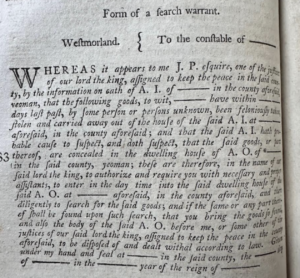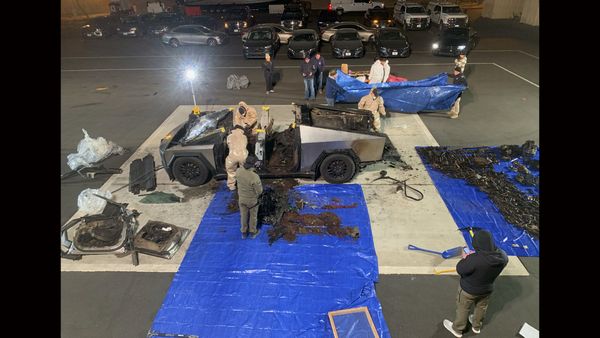If you read a lot of search warrants, you may have noticed something odd about the standard search warrant form. Search warrants command the officer to conduct the search. They don't just authorize the search. Instead they order the officer to conduct the search. The warrant language is mandatory, not permissive.
Consider the federal warrant form. It not only commands the execution of the search, but it puts the command in allcaps and bold: "YOU ARE COMMANDED to execute this warrant . . ." State warrants are written in the same basic way. And authorizing statutes on issuing warrants usually have that language, too.
If you think about it, that's pretty weird. After all, it's the officer who applied for the warrant. The officer is seeking permission to conduct the search, so it's a little strange to order the officer to do what the officer has asked for permission to do.
Plus, despite what the warrant form says, executing the warrant is not really mandatory. If the officer doesn't execute the warrant, that's not a problem. The court can just reissue the warrant if the agents later decide to search, or not if they don't. See, e.g., State v. Nunez, 67 P.3d 831 (Idaho 2003) (holding that, where officers did not execute a warrant during the period it was active and later sought a new warrant, the magistrate judge can just reissue the old warrant on the same piece of paper and it becomes a new warrant).
And sometimes the law doesn't even allow the officer to execute the warrant. If probable cause is lost after the warrant is obtained but before the warrant is executed, the officer can't do what the warrant says he is required to do. See United States v. Spencer, 530 F.3d 1003 (D.C. Cir. 2008) (Kavanaugh, J.) ("[W]hen officers learn of new facts that negate probable cause, they may not rely on an earlier-issued warrant but instead must return to the magistrate—for example, if the police learn that contraband is no longer located at the place to be searched.").
What gives? What explains the mandatory language that gets treated as permissive language in practice?
The answer, I think, is history.
Here's the relevant picture, at least as I understand it. At common law, the basic apparatus of government law enforcement that we know today did not exist. Police as we know it hadn't been invented yet. Victims of crime were mostly on their own. They had to investigate crimes themselves. And they had to bring prosecutions, too. Very few criminal cases were brought by the government. Rather, victims of crimes had to serve as the prosecutors. It was a regime of private enforcement of public rights. See generally J.M. Beattie, Crime and the Courts in England, 1660-1800.
This doesn't mean there was no state at all. Constables were around, and one of their jobs was helping people out with carrying out arrests and (in rare cases) executing search warrants. But there wasn't much of an incentive for constables to do this. One important role of the law of criminal procedure in that era was creating incentives for constables to do their jobs. Here's what I wrote on this back in 2019, focusing on arrests—although the same was true for searches:
The part-time officials such as constables (and I'll just call them all constables for the sake of brevity) didn't have much interest in making arrests and detaining people after the arrest. It was dangerous and time-consuming work, and they in general weren't paid for it. Who wants to risk getting hurt arresting someone and forcibly bringing him to the local judge? There's not nothing in it for the constable. So part of the law regulating constables at common law was about forcing the constables to do their jobs—to make arrests and to detain prisoners—or else face civil suits or criminal punishment.
The law regulating constables had two features relevant here. First, the constable was required to at least try to execute the warrant. A constable who declined to do it could be charged with a crime or sued for neglect of duty.
And second, a constable who made an arrest but then let the prisoner go could be charged with the crime of escape (see 590-95) or sued in tort under the tort of escape. A constable was liable for escape when he made an arrest but then the prisoner went free, either because the constable intentionally let the prisoner go (called "voluntary escape") or the prisoner escaped despite the constable's efforts to detain him (called "negligent escape").
From this perspective, the idea that a search warrant would order the constable to execute it makes a lot of sense. In those days, search warrants were obtained mostly to recover stolen goods. The property owner who had their stuff stolen would figure out where their stuff had been taken, and they would go to the local Justice of the Peace and seek a search warrant to search that place and bring their stuff back. The applicant for the warrant was the victim, and he needed the constable to execute the warrant for him—something the constable may have had no interest in doing.
In that world, a search warrant needed to do more than authorize a search. It had to order the constable to execute the search on the victim-complainant's behalf.
Consider the sample form search warrant that appeared in the influential Justice of the Peace manual, Richard Burns, The Justice of the Peace, And Parish Officer (1793 ed.):

Here, the warrant is being sought to recover stolen goods belonging to the victim, A.I. The victim, A.I., has provided the basis of probable cause. The victim, A.I,, has probable cause to believe that someone stole his stuff and that his stuff is now hidden in A.O.'s house. The warrant is addressed to the constable, and it does "authorize and require" the constable, "with necessary and proper assistants," to break into A.O.'s house and to search A.O.'s house for A.I.'s stolen goods—and if A.I.'s things are found, to retrieve them and (if he's there) to arrest A.O. and to bring them to the Justice of the Peace. The warrant is being sought by the victim, and the warrant is addressed to the constable as an order.
Incidentally, I think this also explains why warrants name the officer—or group of officers—who is required to execute the search. That previously struck me as odd. After all, if the warrant is merely an authorization to search, who cares which specific officer executes it? Some government agent can do it; that's all that should matter, right? But at common law, who executes the warrant was important. In an era when the warrant was commanding the constable to do something the constable probably didn't want to do, it was presumably important for the warrant to state exactly who had the responsibility to do what the court was commanding.
If I'm right, the answer to this puzzle is simple: the world changed, but no one updated the form.
The post Why Do Search Warrants "Command" that Searches Occur? appeared first on Reason.com.







